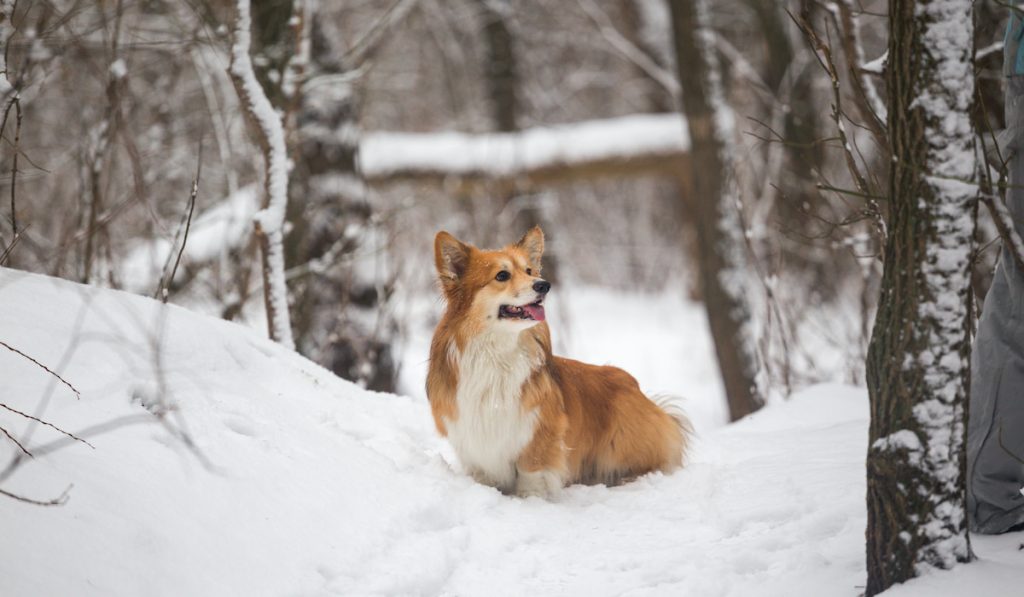Most corgi owners know that corgis tend to be fearless when it comes to the outdoors, however, not all dog breeds are made for the cold. Corgis may not do as well in the cold as you imagine.
Corgis do well in the cold for short periods of time, as long as it is not extremely cold. Thanks to their thick double coats, corgis can survive better in the cold than dogs with shorter, thinner coats of hair. Corgis can get too cold if they are left out in extreme temperatures or for long stretches of time.

Corgis are great indoor and outdoor dogs, however, this does not mean that they are able to live outside in the cold all the time.
The more you understand about corgis and their ability to withstand cold temperatures, the better prepared you will be to care for your corgis in the cold winter months.
How Do Corgis Do in the Cold?
Corgis do relatively well in the cold and are able to withstand rather long bouts of time outside in cold weather. While corgis should not stay outside overnight when the ground is covered in snow or the temperatures are freezing, they do fine in mildly cold environments.
Corgis do not do well in extremely cold temperatures, like when it drops below freezing or if ice or snow is on the ground.
Corgis may have thick coats of fur, but their paws are still susceptible to the cold, especially if they get wet. Snow, ice, and freezing temperatures can be dangerous for corgis if they are outside in it for too long.
What Kind of Coat Do Corgis Have?
Corgis have double coats of fur, which explains the denseness of their thick full coats. Double coats of fur consist of two separate layers: a topcoat and an undercoat.
The topcoat on a double-coated dog serves to protect the dog from parasites and help prevent sunburn. The undercoat provides the insulation that keeps the dog cool in the summer and warm in the winter. The top layer of fur is longer as well as thinner than the undercoat and it is coarse to the touch.
The undercoat fur is shorter, thicker, and much softer than the top layer of fur. This thick, soft layer of fur helps keep the corgi warmer in the cold winter months.
Can Corgis Stay Outside Overnight in the Cold?
Although corgis have thick, cold-resistant coats of fur, it does not mean that they should stay outside overnight in the cold. Their coats may be thick, but they are nothing compared to the coats of dogs like huskies, malamutes, or Great Pyrenees dogs.
Some dogs, like the ones just mentioned, are built to withstand the cold and often prefer to be outside during winter. Corgis are not a part of that mix and should not be made to stay outside overnight in the cold.

Can a Corgi Survive in the Cold?
A corgi can survive in the cold for a while, but not forever. The timeframe that a corgi can survive in the cold varies depending on how cold it is outside and whether or not there are other extreme weather conditions.
If it is raining or snowing, a corgi’s survival chances in cold temperatures can be limited, especially if they are unable to get dry and find shelter or some kind of warmth. Temperatures below freezing can be dangerous and potentially deadly for a corgi if they are left outside in it for too long.
Always be aware of how long any corgi is outside in the cold and make sure it can get inside where it is warm whenever it needs to.
How Long Can Corgis Stay Outside in the Cold?
Corgis can stay outside in the cold for a while, but again, it depends on the temperature and the weather conditions. When temperatures drop below 50°F, corgis should not stay outside longer than 30 minutes at a time, just to be safe.
Many corgi owners say that their corgis do fine in temperatures above freezing, however, just because they want to stay outside, it does not mean they are not too cold. It is best to limit their time outdoors when it is extra cold; they can always go back outside and play after they get warmed up.
Corgis should not stay outside for long periods of time when it is snowing or raining during cold weather either.
Although their coats can repel some water, moisture can still penetrate their fur and cause corgis to experience signs of hyperthermia if it is too cold outside.

How to Tell If A Corgi is Too Cold
There are a few signs that will let you know that a corgi is too cold, even if they are acting like they are not.
- It is shivering – Corgis typically do not shiver because their coats are so warming to begin with. If a corgi is actively shivering, even if not constantly, they are getting too cold and need to get warm.
- It is not walking normally – A corgi’s paws may get so cold outside that it have trouble walking and may even limp or hold its feet up. Walking issues can be a sign that the corgi is too cold.
- It is curled up – Dogs tend to curl up when they are cold and trying to get warm. If the corgi does this outside in the cold, that is a good indicator that it is time to go indoors.
- It is hard to wake up or acting extra tired all the sudden – Corgis that are suffering from extreme cold may have trouble moving, walking up, or standing. They make even act extremely tired. If a corgi does this while it is outside for a bit in the cold, it needs to get warm as soon as possible.
- It is whining – Corgis will whine when something is wrong and if they are whining outside in the cold, take them inside. It may be trying to tell you that it is too cold out there.

Ways to Help a Corgi Stay Warm in the Cold
While their natural coats do help corgis stay warm, there are a few ways that you can help a corgi stay warm.
1. Limit the corgi’s time outside in the cold.
The easiest way to help a corgi stay warm in the cold is to limit its time outside in the cold weather. They may act like they want to stay outside, but make them go inside to warm up after 30 minutes or so.
2. Get the corgi a sweater.
Not all corgis enjoy wearing clothes, but they may not mind wearing a warm sweater in the cold. Sweaters can help corgis stay warm in the cold, especially if you both have to be outside in the elements for longer than 30 minutes.
3. Buy the corgi a waterproof jacket.
A waterproof dog jacket can help limit the amount of water that seeps into the corgi’s fur when it is snowing or raining.
This will help keep the corgi warm in the cold because it helps to keep them dry.
4. Invest in some dog shoes for the corgi.
Usually, the first thing to get extra cold on a corgi is its paws. To combat this, try putting dog shoes or boots on its feet.
If you can get the corgi to wear and actually walk in them, it will help to keep their feet dry and warm in the cold.
5. Provide a warming station nearby where it can warm up in.
If you must be outside for long periods of time and the corgi refuses to go in the house, consider setting up a warming station nearby for it.
A dog blanket, bed, and a warming blanket can do wonders in a barn or shed for a corgi. This will allow them to get warmed up and spend longer amounts of time technically outside.

Final Thoughts
Corgis do well in the cold, but only for limited amounts of time and now you know exactly why.
Corgis may have thick double coats, but they are not winter dogs and they cannot survive extreme cold temperatures or even snow for a long period of time.
You now know exactly how to tell when a corgi gets too cold and how you can help it stay warm in the cold.
Resources:
Writing this article about corgis and how they do in the cold was a real adventure. Here are the sources that I used for this article.
